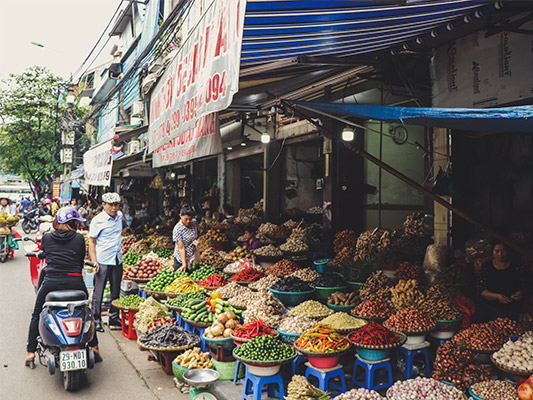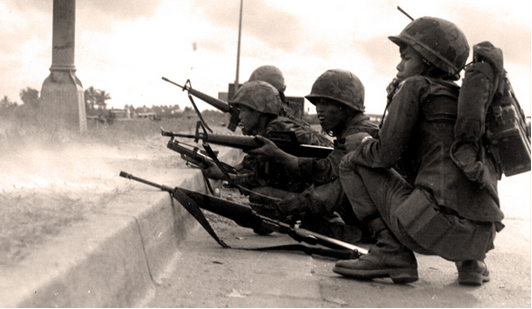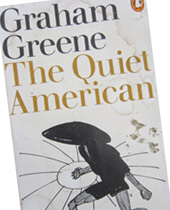For his fans Graham Greene was not just a novelist, he was a literary prophet who foretold the currents of 20th Century history.
Much of that perception rests on The Quiet American (1955), Greene's middle-period novel set at the height of the French Vietnam War. The book has been read as forewarning that the US's attempt to prevent the reunification of Vietnam under Communist rule would - like the title character of the book - come to a sticky end.
Temperamentally restless and fond of conflict, Greene served as a foreign correspondent for four winters in Vietnam during the 1946-1954 war, reporting for The Sunday Times and Le Figaro. He saw up close France's agonies of wounded pride and moral compromise as it struggled in an inglorious colonial war against an elusive enemy, the Viet Minh. As related in his autobiography Ways of Escape (1980) Greene had good access to the highest levels of the French command and to Viet Minh agents, and was later to interview Ho Chi Minh.

Set in 1952 while the Battle of Hoa Binh was still raging, the novel tells the story of a middle-aged and world-weary English reporter called Fowler, whose 20-year-old Vietnamese girlfriend is won over by an idealistic and naïve young CIA officer called Alden Pyle, a rookie in the ways of the East but with misguided presumptions about the right path for this tinderbox country.
This three-way dynamic, soaked in Greene-esque sexual jealousy and self-pity, seems be intended to represent the assault on inscrutable Vietnam, first by a decaying and self-serving colonial regime, then by a clumsily idealistic but hypocritical superpower.
Fans of GG will be familiar with the book's portentous moral equivocating of which he was the 20th Century's leading adept. Published as it was at the height of the Cold War and of McCarthyism, it must seemed a full-frontal assault on Uncle Sam by a limey fellow traveller (which to be fair Greene was).
The contrast of American good motives and bloody deeds is embodied in the character of Alden Pyle, the crew-cut Bostonian with a comic sense of chivalry and his academic anti-communist ideology. Through him, the novelist satirises the chances of building a "Third Force" alternative to colonialism or communism by promoting acts of random violence by unreliable and fractious South Vietnamese political partners.
The novelist lays out the landscape of Saigon where most of the action takes place, and the North, where the hero goes to report, with a practiced journalist's eye. There is vivid local colour, for example a visit to the bizarre Cao Dai sect in Tay Ninh near Saigon and the "Walt Disney" temple there. There are pages seemingly lifted from a war reporter's notebook: a slaughter of villagers at Phat Diem, a terrifying Viet Minh night attack on a watch tower near Nam Dinh in the Red River Delta, a bombing raid on Lai Chau on the Chinese Border, the carnage of a horrific café bombing in Saigon.
But there isn't even much information about the reasons that the war against the Vietminh was happening, let alone the reasons why this sensually-described edifice of Frenchness had been imposed on the country for the preceding 70 years.

Not then book to read for profound insights into Vietnamese culture or nationalist tradition, or even of French rule. Instead a vivid snapshot of Saigon at the end of the colonial era, and glimpses of the war in the North, suffused with the cynicism and melancholy that Greene fans will know and love.
It took no great foresight for Greene to foretell that the French would lose the war (in any case they had surrendered before the novel was completed). The impressive piece of "prophecy" was to show in advance how the US would blunder in Vietnam in the pursuit of impossible ideals.
It was Greene's novel which first highlighted the improbability of success of an all-out hearts-and-minds approach, intended to embed democracy with civics lectures, hard cash, and napalm.

He is certainly adept at appealing to a certain type of male fantasy, albeit of a somewhat un-PC variety. Who wouldn't want to have their nightly opium pipes prepared by a soon-to-be-naked 20-year-old Annamite beauty? To see sunset on the limestone islands of Halong Bay from a low-flying French bomber? Or to play dice for Vermouth and cassis on a tropical evening in the Continental Hotel with the local Sureté boss?
With his gruff Hemingway-esque economy with words as well as his eye for exotic locations, there's no great secret about GG's appeal to the paunchy, balding armchair reader in rain-soaked Britain.
The book's biggest problem is that the boy scout title character is a composite of condescending clichés about Americans, for whose perceived vulgarities GG seems to possess unbounded hatred that distorts his artist's instincts. Alden Pyle is a wholly unconvincing as a man, even more so as a trained CIA agent, so the love triangle at the book's core feels equally phoney.
But for all its faults as a novel The Quiet American deserves its place in Pandaw's onboard library, not just because of the fame the influence of its reportage, but because its point that well-motivated people do terrible things was so well borne out by subsequent events in Vietnam. The intensity and agony of the decades that followed have given it a retrospective authority, and ensured its survival.



